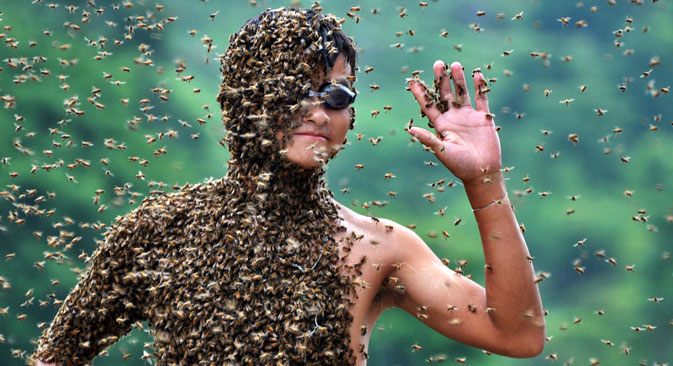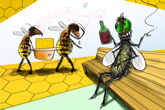Tales of birds and bees, planes and trains

Unlike recent headlines about deadly spiders invading British homes, this was no tabloid tale of innocents stung to death by wasps or hornets. Source: TASS
England is a dangerous place. At every turn there are killer bees and spiders so venomous entire families flee their homes.
That's the impression of life in Britain you gain from reading Russian press reports.
There's a grain of truth in it: the Bees, Wasps and Ants Recording Society (BWARS) has issued a report identifying bee deaths in the past 165 years.
Unlike recent headlines about deadly spiders invading British homes, this was no tabloid tale of innocents stung to death by wasps or hornets. It is a grimmer story of the 23 species "pollinating insects" that have disappeared from the British countryside since 1850.
The news surfaced in Russian weather app, gismeteo.ru, which reports BWARS analysis of "more than 5,000 observations of bees, wasps and ants."
Russia is a nation of honey-lovers; beekeeping is widespread and on any visit to the countryside during the summer you will chance across beehives. The soporific sound of buzzing bees, that lazy sense of warmth, is as much a part of Russian summers as drinking kvass, the mildly alcoholic brew made from fermenting stale black bread.
Sadly, it seems, those same halcyon sounds of English summers past are gone forever. BWARS, funded by British government environmental and nature research bodies, says bees are dying out. Neither global warming nor the impact the EU's Common Agricultural Policy, are to blame, but "changes in agricultural policy immediately after the First World War."
Creepy crawlies
It's nothing to laugh at, unlike the spate of stories picked up by Russian media a couple of months ago when the Brits were going through one of their periodic panics about creepy crawlies.
There are plenty of reasons for arachnophobia in the British Isles. A temperate climate and draughty, poorly insulated homes, offer an ideal environment for spiders to flourish.
Russians, used to their own unpleasant and unwelcome visitors, cockroaches, tend to take spiders in their stride.
Livejournal has a blog dedicated to spiders commonly found in Russia and family-friendly pet website, 8lap.ru offers a useful guide to identifying the poisonous ones.
"Created by people who cannot imagine their life without animals, and for those still undecided," the site explains there's only one deadly spider in Russia, the black widow. Those furry tarantulas found in the Kuban or Caucasus, are just a bit bigger and hairier than normal cuddly field critters.
If a black widow should bite you, don't worry it cheerfully informs: "It is recommended to perform a simple action. Cauterize the bite. To do this, best use a match."
The same sanguine attitude can be found in Ukrainian site Defacto's tale of a "deadly spider found in a bunch of bananas in England," which tells us that an English family fled their home after finding a huge tropical example in some groceries.
Its British press source was more excitable, the normally staid Guardian, screaming: "Killer spider found in family's supermarket shopping."
Dead stiff
The real killer line in the report, apparently not spotted by normally eagle-eyed Russian hacks who make a living trawling and translating the British press, was that the "aggressive and lethal Brazilian wandering spider," usually found in rain-forests and highly toxic, with venom that can kill in two hours, has, ahem, another function.
A pest controller who caught it did not squash it underfoot, but instead caught and sent it to a "European research centre."
Why on earth?
"Although its venom is highly toxic, it is being studied for use in erectile dysfunction treatments," the Guardian deadpanned. "The spider's bite can cause an erection that sometimes last for up to four hours."
And you thought that was rigor mortis?
All of which leaves little space for the air traffic control failure above southern England, when a computer glitch caused chaos. The ripples were felt as far as Baku, with Russian language site, news.day.az warning readers to "expect delays of up to two hours."
It's not the first time Russian readers have learned of air traffic control failures over Britain's skies: newsru.com covered an identical story back in 2004.
Intrepid travellers
With all this chaos, fear and death, it is not surprising that a couple of adventurous young women from the ancient city of Ryazan, 150 miles south-east of Moscow, decided to take an "extreme" tour of Britain, as local news source Okna Goroda (City windows) reports.
Nastya and Alyona arranged the visas themselves, booked flights and secured accommodation through room-sharing website, Couchsurfer.
They slept on a cemetery bench in Scotland; fled their first host, a London man who demonstrated an "ambiguous" interest in the two pretty young lasses, and almost fainted at the cost of a ticket on the London Underground, then 200 roubles, but at current exchange rates closer to 450 roubles (£4.70), for a single ticket.
British guys hit on them; local girls resented them, giving them "scornful" glances; and prim English families raised eyebrows when the pair took a dip in the chilly waters off Brighton without bathing suits. The site, rated 16+, does not explain what they wore for their swim.
Their next exotic destination is Vietnam, where they can be sure the spiders are just tiny. Teeny-weeny. Honest.
The opinion of the writer may not necessarily reflect the position of RBTH.
Read more: UK-Russia crossviews
All rights reserved by Rossiyskaya Gazeta.
Subscribe
to our newsletter!
Get the week's best stories straight to your inbox


